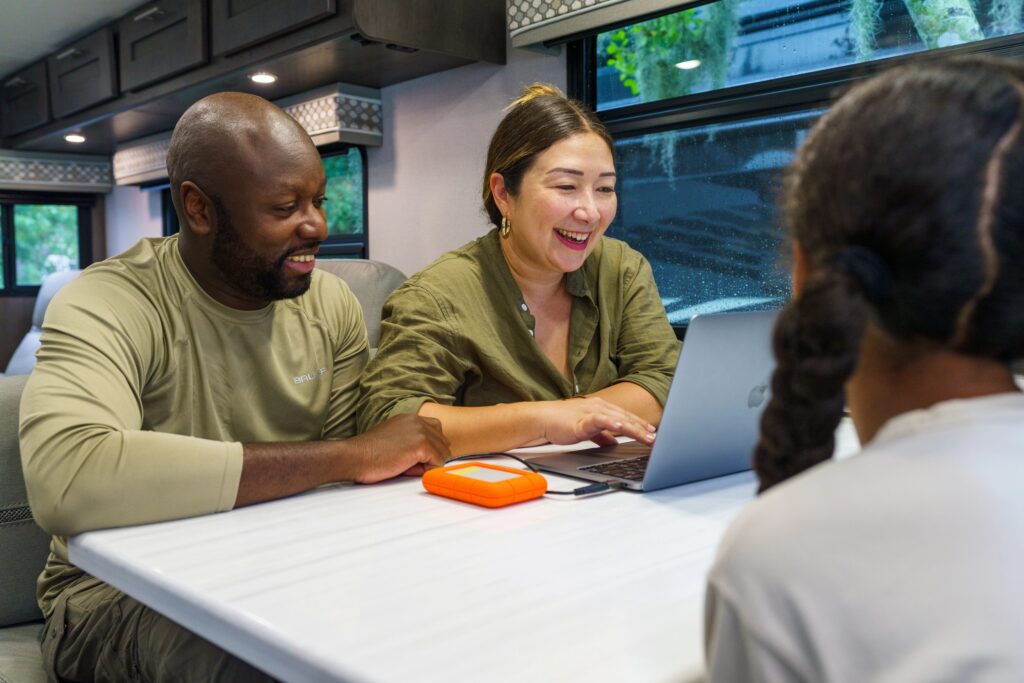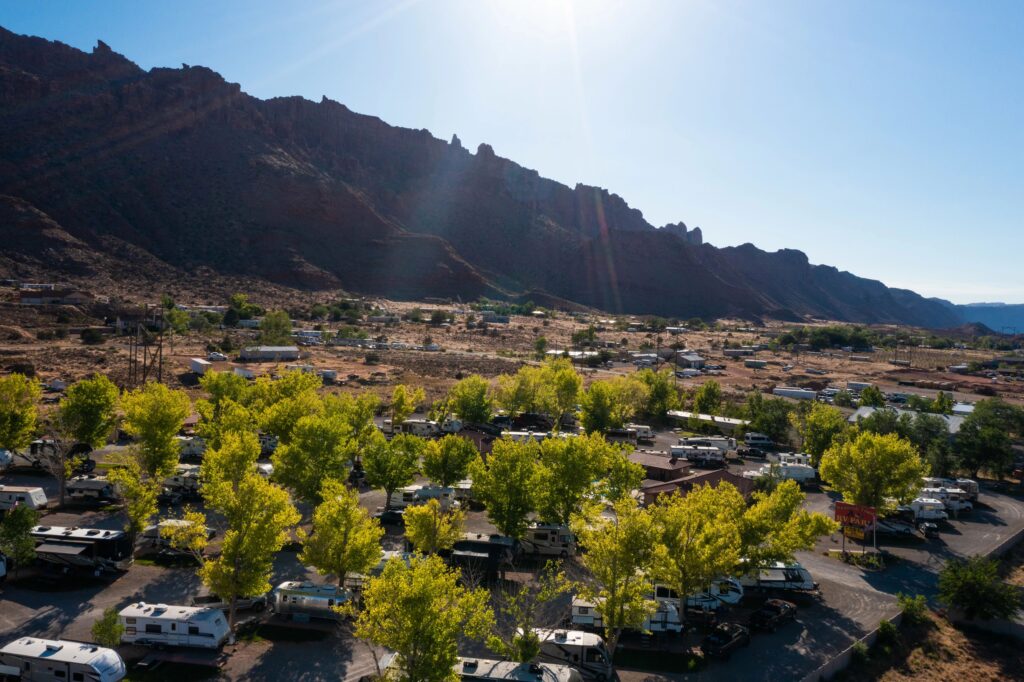Social media can be intimidating for campground owners. We have enough on our plates already just managing the day-to-day of our parks, and the thought of building a presence on social media is an added weight. You might wonder things like:
What social media platform(s) should I be on?
How can I possibly keep up with regular social media posts for my campground?
What will social media do for me?
These are all fair questions. The good news is that, with the right strategies in place, social media can be a smooth endeavor that reaps rewards in terms of increased buzz, new guests, and people sharing your park with their friends, all of which make your campground more profitable.
Social Media For RV Campgrounds
Social media is about building community and sharing your story. That’s why RV park owners like us can use this tool to help people get excited about staying before they even arrive.
For example, you could share beautiful photos of special glamping options you may have, attractions near you, or guests having fun around the campfire. These images will help prospective guests paint a picture in their minds of what it’s like to stay at your park.
Or, you could share stories on social media of rockstar guests or team members you have on site. Encourage these same folks to share your post with their friends to increase the reach of that post.
Ultimately, social media for RV parks is about shaping the story you tell the world so that you draw in more of your ideal customers.

What Social Media Platforms Are Out There for Campground Owners?
The number of social media platforms out can feel overwhelming. But you really only need to seek out the one or two platforms that make the most sense for your park and focus on those. Let’s dig into the social media platforms out there and when they might be a fit:
Instagram – This image-focused platform is perfect if you have unique campground features that are particularly photogenic or if you offer scenic views.
Facebook – Every RV park should have a Facebook page at a minimum because it’s something people look for these days. Facebook pages are quick and easy to create, and they’ll serve as a place for users to find your hours, general information, and a few pictures.
Facebook is also great for posting about upcoming events, special attractions near you, and guest stories at your park.
Twitter – This platform allows you to make 280-character posts that seem most effective for politicians and celebrities. While you should feel free to use any social medium to promote your park, Twitter can be hit-or-miss for businesses connecting with customers.
TikTok – TikTok allows users to make short videos that can go viral fast. This can be a good way to generate buzz for your park if you have an interest in videos and have (or can create) some visually stunning elements at your park.
Snapchat – Similar to TikTok, both are popular with younger generations if that’s a crowd you’d like to attract.
Pinterest – Pinterest is a unique bird that nonetheless can generate significant traffic for you if handled correctly. Think of Pinterest as a social bulletin board that allows people to pin cool pictures, articles, and other things they’re interested in one place. Pinterest can be a highly effective tool for RV parks that can create boards about stunning nearby attractions and notable amenities at the park.
For example, if you’re near a national park, you could create a Pinterest board that gives folks all the info they’d need for an RV visit to that park. Because your Pinterest board links to you, it would be natural for many readers of your posts to stay with you.
LinkedIn – This is a platform for professional networking. It might be worth your time there to make business connections, but it’s generally not the place to draw in new guests directly. B2B social media for your park is a great way to learn more about the industry and connect with other businesses and campgrounds that might benefit your efforts.
YouTube – While it’s primarily a platform to watch videos, YouTube has many of the same social media features in the sense that people can comment, share, and build community around content. This could be a good platform for you if you like video, have the time, and have a unique visual story that would be attractive to people.

Which Social Media Platform Is Best for Campgrounds?
The answer is: It depends. If you have an RV park that features scenic views, glamping options, yurts, or other unique camping experiences that are visually appealing, then Instagram could be your best bet.
If you’re more of a traditional RV park, something like Facebook would likely be where you’ll want to focus most of your energy.
Or, if you view yourself as a cutting-edge park wanting to appeal to a younger crowd, then Snapchat, TikTok or YouTube could be your jam.
In short, the best social media for your park is a platform that helps you best tell your story to the right people in a way that you can manage.
11 Powerful Ways To Use Social Media at Your RV Campground
Now that we’ve chatted about the different social media platforms, let’s unpack 10 strategies for utilizing social media no matter which platform you focus on.
1. Choose one or two platforms and nail it
One of the best ways to tank your social media strategy is to try to be everywhere. There are too many social media platforms for you to do all of them well. Pick the one or two that fit you best and put focused intensity there.
2. Be conversational
Social media is a back and forth. You should engage with past, present and future guests on social media to keep your story fresh. Also, be sure to pay it forward by sharing other people’s stories, liking other people’s posts, etc.
3. Know your tribe
Who is coming to your park? Who do you want to come to your park? Knowing the answer to these two questions will guide the language you use and the story you tell in social media.
4. Have a plan
Randomly posting once in a while without a plan is generally not a good idea on social media. Consistency is key. That doesn’t mean you have to post every day, but if you decide to post once per week stick with that plan.
You could also use a social media scheduler like Hootsuite or Tailwind to help you stay on top of this.
5. Create searchable content
Social media can be a great way to boost your ranking on search engines if you create posts that provide answers to questions people are searching for.
For example, you could figure out what travelers are searching for in your area and create social media posts that help them plan their trip.
6. Call your followers to action
Sharing your story and creating posts is essential on social media. It’s also vital that you have a strategy for frequently calling people to action. You could run a monthly special at your park that you share on social media, ask your followers to leave you a review, or even host a contest on social media to bring new business to your park.
7. Seek out influencers
These are people on social media with large and engaged followings. Within the full-time RVing niche, for example, there are many couples and families who are sharing their journey with sizable audiences.
You can connect with influencers in many ways. One example would be inviting them for a free stay at your park in exchange for sharing a story about you with their audience.
8. Stay focused, and avoid the social media black hole
Social media is effective when you choose the right platform for you and combine it with a planned strategy.
Social media is ineffective if you get drawn into the drama, don’t measure the results it’s giving you, or if you otherwise get sucked into conversations that don’t help you move the needle.
9. Consider social media ads
Buyer beware: These can cost you a lot of money without generating a result if you don’t know what you’re doing. But, if you’re willing to invest the time and energy into learning effective social media advertising, it can generate new reservations for your campground.
The key is that you measure the impact of each dollar you spend.
10. Measure what’s working, ditch what doesn’t, and double down on the rest
Test a few different social media platforms at the beginning to discover the one or two that’ll work best for you.
Look at the end of every month and see which social media posts got shared and which didn’t.
If you ran any deals or coupons on social media, which ones were the most impactful?
By taking steps like the ones above, you can figure out what’s working and what’s not. Double down on what does and ditch the rest.
11. Utilize the best tools available to get your name out there
Be open to the benefits of various social media strategy tools available to the industry. You aren’t alone in this endeavor, and you can leverage the reach of other brands to make your campground known to whole new audiences of potential guests. Social media has proved to be a powerful advertising tool, especially in the hands of experts.
For example, the Good Sam digital marketing team can help you create impactful social media ad campaigns that will appear in the newsfeeds of millions of interested outdoor enthusiasts. Good Sam can help grow your presence online, build brand awareness, and drive clicks to your website, leading to new guests making reservations at your campground.
While tools like these are an investment, the business you’ll generate should offset the adverting costs.
As campground owners, we can choose to embrace social media or shy away from it. But should you opt to use it. The beauty of social media is that it doesn’t have to be complicated or expensive to reach your target customers. You’ll reap the benefits of these powerful platforms by implementing a straightforward and focused social media plan.